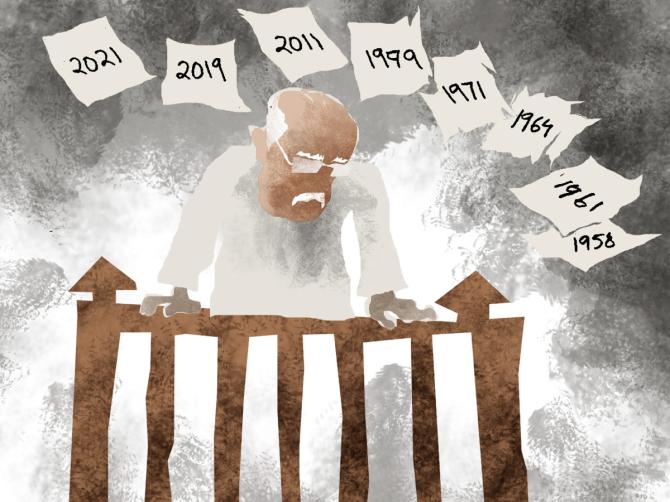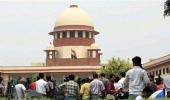Are breakthroughs on this imminent, asks Ajit Balakrishnan.

A couple of times a year I encounter some event that makes me rub my eyes or pinch myself, worrying that I am asleep and dreaming. I found myself doing that one day last week, when I was at a Webinar I was invited to attend.
Let me try it on You, dear reader, and see whether you have the same reaction:
Question: Who in India would make a statement like this?
'It is automatic for Counsels to ask for an adjournment of 12 weeks when a case which was adjourned in 1971 is listed for hearing today, 2020.'
Choose from one of the following alternatives as to who could have made that statement: a. A journalist seeking headlines; b. A cynical intellectual; c. A high court judge.
If you chose answer (a) or (b), you would be wrong. The correct answer is c. A judge of the Bombay high court!
Now you can see why I had to rub my eyes and pinch myself to verify that I was awake and not dreaming! I heard this at the Webinar, convened by the Forum for Fast Justice.
Practically all of us in business in India try as much as possible to avoid litigation even if it is about as simple an issue as a contract dispute with a customer or supplier because we know that, to start with, the case you file will not come up for hearing for a year, and, even when a hearing is scheduled, it would get adjourned multiple times.
The statistics on the pendency of court cases in India are staggering.
According to the official National Judicial Data Grid, there are close to half a million cases pending in high courts for five years or more and, of those a quarter million are pending for 10 years or more.
When you come to the next level of courts, the district and taluka courts, there are six million cases pending for five years or more, and of those 2.5 million are pending more than 10 years!
On the one hand, these staggering numbers speak of the faith that we Indians have in our judicial system, and, on the other hand, they drive some of us analytical types to seek reasons for this scale of court backlogs.
The first issue I have learned is that India is a common law country, like our former colonial rulers, the Brits. In such countries' decisions made by courts in the past are binding on cases which come up later in time.
In addition, decisions made by higher courts are binding on lower courts and further, decisions of the highest court, the Supreme Court, can generally only be overturned by that same court or through legislation.
This means that for any decision that comes up before a judge, s/he will have to examine all 'precedents' before a judgment is pronounced.
Counsels representing the plaintiffs and the defendants also have to elaborately research and make their arguments, citing relevant precedents.
The higher judiciary appears to recognise the issue of delayed justice and the high and mounting backlog of cases.
An eCourts initiative has been at work since 2005 and to cover nearly 15,000 courts in India. Like many other online efforts, it appears to have received a boost during the past nine months of the Covid, said Justice Gautam Patel at the Webinar I attended.
Their current bet is on 'virtual courts', where court hearing is held using online tools such as Zoom and the plaintiff lawyers, the defendant lawyers, the judges hearing the case, and the court officials are present online. This effort seems to be taking off.
The benefits of eCourts are starting to be appreciated. As Justice Ravindra Chavan pointed out at the Webinar, 6,000 public health officials are summoned every day to give evidence: They waste their time travelling vast distances to give evidence, only to find the case adjourned or, even if they are heard, they are given a 30-minute hearing. This kind of wastage of time also is inflicted, he says, on police officers.
As he correctly points out, if these hearings had been online (ie, virtual courts), the saving of time would be enormous as they could provide evidence from wherever they are physically located and do not have to travel long distances and wait endlessly for cases to be called.
Multiple other efforts are already under way to use information technology to ease the work of both lawyers and judges.
To start with, there is the venerable All India Reporter which, for the past nearly 100 years, has provided the database of past cases -- these are the brown, leather-clad tomes that you see in the background of every photo of a judge or a prominent lawyer. The All India Reporter is now available in an online version.
Manupatra, Kanoon, NearLaw, casetext, and Lex Machina are some of the other online searchable databases of past cases. An online searchable database that instantly gives you results when you put in keywords will certainly save a lot of effort for both lawyers and judges.
The big prize will go to those search tools that give you not just search results, but also results based on correct precedents.
A slew of start-ups attempting to provide tools to speed up other parts of the judicial value chain are also at work: SpotDraft, legalKraft, Law Geex, and Legality focus on speeding up the creation and review of contracts.
People like me, enthusiastic practitioners of machine learning/deep learning/artificial intelligence, look at these databases of court judgments just as little kids would look at a tub of ice-cream!
Where else will you get datasets of a million decided cases and further millions of pending cases to play with our algorithms! And in the process possibly help speed up justice in India!
Ajit Balakrishnan (ajitb@rediffmail.com), founder and CEO, Rediff.com, is an Internet entrepreneur and chaired a committee set up by the ministry of human resource development on education and entrepreneurship last year to provide inputs for the National Education Policy.












 © 2025
© 2025